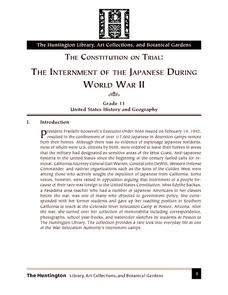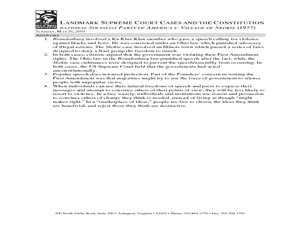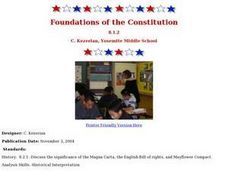Curated OER
Landmark Supreme Court Cases and the Constitution: Reynolds v. United States (1878)
Students examine the impact of court decisions. For this Supreme Court lesson, students read the Reynolds v. United States (1878) case study regarding first election decided by the House of Representatives. Students take notes on...
Curated OER
The Constitution on Trial: The Internment of the Japanese During World War II
Eleventh graders analyze primary source documents during the Second World War. Students recall statements of Japanese-Americans who were placed into internment camps during the war.
Curated OER
Bill of Rights Booklet
Students design a booklet that explores the Bill of Rights. They summarize each of the rights, write a personal response to each entry and create an illustration to interpret each of the rights. Students then make a cover and title page...
Curated OER
Justice in America
Eleventh graders analyze primary sources for evidence of intent and purpose. In this American government lesson, 11th graders compose a one-page response explaining their understanding of "justice." Students read and examine quotes about...
Curated OER
The Constitution and Our Republic: Political Parties and the Election Process
Students discuss the role of political parties in the election process. In this election process lesson, students work in groups to examine the major functions of political parties and the role political parties play in the election...
Curated OER
Landmark Supreme Court Cases and the Constitution: National Socialist Party of America v. Village of Skokie (1977)
Students examine the impact of court decisions. In this Supreme Court lesson, students read the National Socialist Party of America v. Village of Skokie (1977) case study regarding First Amendment Rights. Students take notes on the case...
Curated OER
Presidents and the Constitution: George W. Bush and the Case of Bush v. Gore (2000)
Young scholars examine the impact of court decisions. In this Supreme Court lesson, students read the Bush v. Gore case study regarding the presidential election of 2000. Young scholars take notes on the case and respond to discussion...
Curated OER
Bill of Rights and Lawmaking
Ninth graders consider how the Bill of Rights impacts the lawmaking process in the United States. In this Bill of Rights lesson, 9th graders discuss the amendments and their limitations. Students research the role of the Legislative...
Curated OER
Introduction to "Julius Caesar"
Students discuss American form of government. They read the play Julius Caesar.
Curated OER
Foundations of the Constitution
Eighth graders explore the Magna Carta and the Mayflower Compact.
Curated OER
Deerfield Debates Its Future: What Constitutes Progress?
High schoolers explore the many resources that one can use to explore a community, the Colonial Revival movement, and how the industry and technology reshaped life in Deerfield the Connecticut River Valley.
Teaching Tolerance
Human Rights
High schoolers investigate the concept of human rights by focusing on the Vietnamese people. They conduct research about the South Vietnamese prisoners and how they have been treated during the conflict and in modern times. A research...
Curated OER
Ideas in Action Word Search
In this United States history word search worksheet, students locate 26 places, names, and terms pertinent to the Enlightenment which are hidden within the word puzzle. A word bank is included.
Curated OER
Presidents and the Constitution: Washington, Adams, Jefferson, Madison and the Barbary Pirates
Students explore the Barbary Pirates of the Mediterranean. In this American history lesson, students read a narrative regarding the conflict between the Barbary Pirates and the United States under the leadership of Washington, Adams,...
Curated OER
Loyalists
Students explain why some colonists remained loyal to England during the American revolution. In this social studies lesson, students write a letter to an editor about their reasons for remaining loyal to England.
Judicial Learning Center
The Power of Judicial Review
Marbury v. Madison is arguably the most important landmark case in the history of the Supreme Court. A fact-filled lesson provides background information about the case and two others related to the concept of judicial review. Scholars...
Mrs. Hodges' Social Studies Classes
I Have Rights?!
Do young people have rights in the United States? Your pupils will not only learn the answer to this important question, but will also build vocabulary through cloze activities and gain a thorough introduction to the Bill of Rights.
Judicial Learning Center
Your 1st Amendment Rights
Why should classes care about the First Amendment? An engaging lesson serves as a powerful tool for answering just that. As all four cases in the lesson relate directly to freedom of expression in schools, young scholars explore the...
Judicial Learning Center
Your 4th Amendment Rights
Americans love to learn about their rights, especially those that protect them from the government's power to invade their privacy. Young people are especially engaged by this topic. An informative lesson explores four Supreme Court...
Judicial Learning Center
Levels of the Federal Courts
The Supreme Court gets all the glory, but very few federal cases make it to the highest court. An interesting lesson explores the structure of the lower levels of the federal court system. In addition to outlining the organization of...
K12 Reader
What is a Tribal Government?
What is life like on a Native American reservation? Learn about the ways a tribal government works with a reading comprehension activity. After reading a short passage, kids use context clues to answer five comprehension questions.
iCivics
You've Got Rights!
If aliens invaders nearly destroy the world in the distant future and leaders must decide on a pamphlet of protections to preserve individual rights, what should they include? Introduce the Bill of Rights and the struggle between the...
City University of New York
Electoral College
A presidential election is a lot like the 2004 World Series, and it's also a lot like choosing an orange in a paper bag. Apply the process of the electoral college to these two analogies with a set of lessons about government...
School Improvement in Maryland
Dividing the Powers of Government
Who does what? To develop an understanding of the balance of power between the US federal and state governments, class members research responsibilities in terms of legal systems, security issues, economic activities, lawmaking, and...
Other popular searches
- Constitutional Convention
- Constitution Week
- Us Constitution
- U.s. Constitution
- Constitution History
- Constitution United States
- Constitutional Law
- Constitution Day
- The Constitution
- Constitutional Amendments
- Constitution Lessons
- Constitution Readers Theater

























